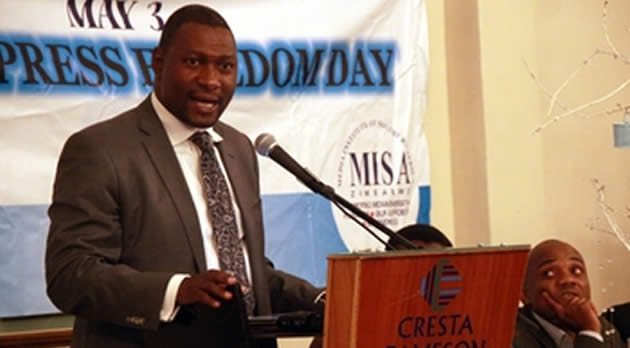Govt consults on media law amendments

Daniel Kachere Herald Reporter—
Government is consulting stakeholders on amendments to the criminal defamation law and statutes restricting the practice of journalism by causing the arrest of scribes. This was revealed by Information, Media and Broadcasting Services Deputy Minister Cde Supa Mandiwanzira at a workshop organised by the Media Institute of Southern Africa ahead of World Press Freedom Day in Harare yesterday.
“Professor Jonathan Moyo has been very clear and the ministry has been very clear on its sentiments with regards to this law vis-a-vis our new Constitution,” he said.
“That we continue to have criminal defamation and journalists still being arrested is a result of our structural circumstances. For as long as the law is in place despite our sentiments as the ministry that superintends over the media which are most affected by this law, we have to also acknowledge that the law is still within our books and that Parliament has not done anything yet to adjust that law.”
Deputy Minister Mandiwanzira said the situation needed to be addressed urgently.
“You have to take the provisions of the new Constitution and put them into law. So it is a process that requires not just Government to do it but also a consultation process that is taking place from a media point of view where we have IMPI (Information and Media Panel of Inquiry) doing the work,” he said.
Deputy Minister Mandiwanzira said his ministry was against the arrest of journalists for criminal defamation.
“We are opposed to it as a ministry. Does that mean then that we are opposed to police action? No we are not, they are doing their job.
“The police are doing their job in the situation that we have, that the law is still within our books because if they do not do it, it will be a dereliction of duty on their part,” he said.
He said as a ministry they were in a difficult situation to adjust to these circumstances. The arrests of journalists making the headlines of the country’s newspapers undermined national efforts to remove perceptions of Zimbabwe as a pariah state where human rights are not respected and media freedom does not exist.
The Information and Media Panel of Inquiry comprises 28 members including several senior journalists and experts from other professions.
It was established last year to promote and elevate the standards of media practice in Zimbabwe.
Seven thematic committees were set up to cover issues including media as business, information platforms and content of media products, media training capacity building and ethics, media law reform and access to information, employment opportunities and conditions of service of journalists, polarisation, perception and interference as well as gender issues and media advocacy.











Comments